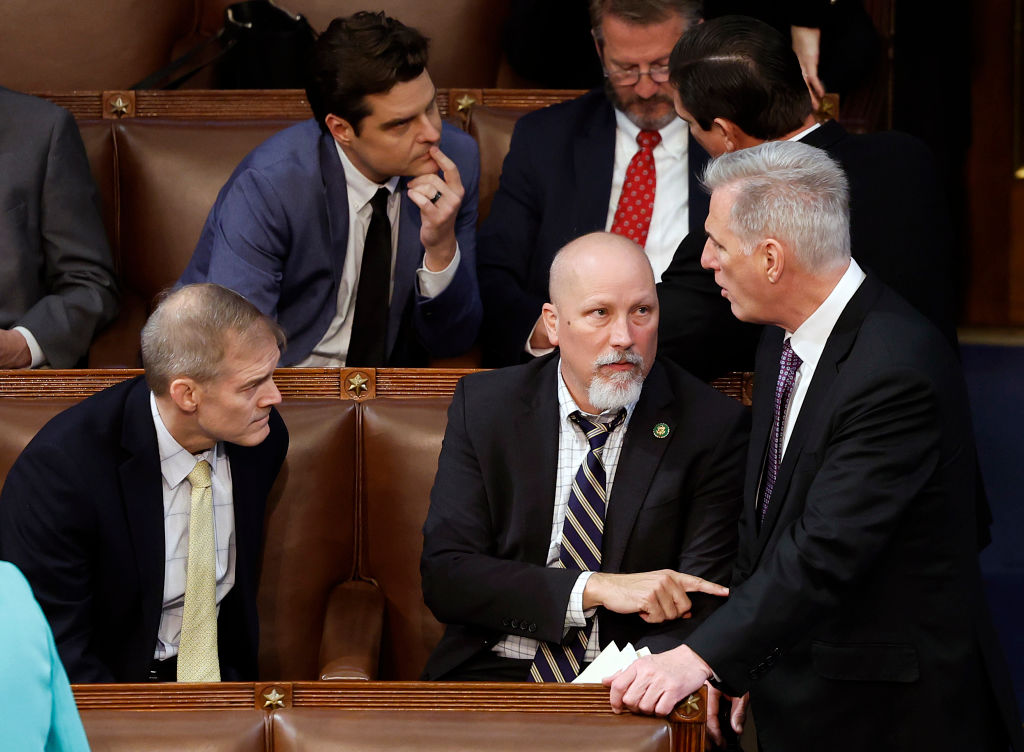The nominating speeches sounded different, but the facts on Wednesday remained the same as on Tuesday: After three failed votes, House GOP leader Kevin McCarthy made no apparent progress toward garnering the 218 votes he needs to become speaker of the House.
With no endgame in sight and the protracted stalemate wearing on House Republicans’ nerves, some McCarthy allies began to signal Wednesday that a deal has to come soon or McCarthy may have to step aside.
“At some point this needs to break loose,” Rep. Ken Buck said on CNN. “He either needs to make a deal to bring the 19 or 20 over, or he needs to step aside to give somebody the chance to do that.”
The pressure led McCarthy to make at least one major concession to his critics Wednesday night: The Congressional Leadership Fund, a McCarthy-aligned super PAC, agreed not to boost candidates in open primaries in safe Republican districts. The move could prove a major boon to hardline conservatives who want GOP leaders to take a hands-off approach in Republican primaries.
He has also reportedly offered more concessions to placate House Freedom Caucus members: allowing just one member to force a vote to remove the speaker; putting more Freedom Caucus members on the House Rules Committee; and promising votes on term limits and border security bills. It’s unclear whether the late night offer will pay dividends on the negotiating table.
McCarthy has pledged to stay in the race as long as it takes for him to become speaker, but his opponents have shown few signs of moving toward supporting him. He did obtain one slim victory Wednesday: After three votes and several hours of closed-door meetings with his critics, McCarthy successfully pushed for a motion to adjourn the House Wednesday night. Members are scheduled to return Thursday at noon.
“Leadership doesn’t want this to stay on the floor,” said Tennessee GOP Rep. Tim Burchett, who supports McCarthy but often sits next to Freedom Caucus members in the chamber during votes, including this week. He acknowledged that McCarthy’s opponents “have very dynamic speech-makers.”
“They literally kick their butts on the floor,” he said.
On Wednesday’s first ballot—and the fourth overall—the roughly 10 percent of the Republican conference who defected from McCarthy united around second-term Rep. Byron Donalds of Florida. It was a switch from Tuesday’s nomination of Ohio Rep. Jim Jordan, who has endorsed McCarthy.
Texas Rep. Chip Roy, who had voted for Donalds on the first ballot on Tuesday, formally nominated him on Wednesday, noting that for the first time in history, two black Americans had been nominated for speaker of the House (the other being the Democrats’ candidate, Hakeem Jeffries of New York).
For the rest of the day, Donalds remained the default anti-McCarthy vote—though Indiana Rep. Victoria Spartz voted “present” repeatedly, telling reporters she still supports McCarthy but wants to see movement on the speakership race and he needs “to be able to address the concerns of other people.”
While she and others grew weary of the stalemate, McCarthy’s allies argued for him to remain in the race. “This is going to be an incredibly difficult place to lead over the course of the next two years,” GOP Rep. Dusty Johnson of South Dakota told reporters Wednesday. “Kevin McCarthy is so much better positioned to be able to do that than anyone else. If it’s not Kevin McCarthy, I wouldn’t wish that job on any single human being in that chamber. Full stop.”
And Rep. Dan Crenshaw, who has described McCarthy’s opponents as terrorists, vowed to continue supporting him and said he would “never vote” for the group’s preferred candidate.
The uncertainty has drawn unusual spectators. Former Rep. Justin Amash, a libertarian who has been pitching himself as an independent option for the speakership, flew into Washington, D.C., to witness the floor fight—and offer himself as a speaker candidate.
“I love this stuff,” he told reporters upon arriving. “I wish this had happened when I was in Congress. We tried to prevent various speakers from getting elected multiple times. And it’s nice to see it actually working out, at least for now.”
He spent the afternoon on the House floor speaking with McCarthy’s opponents, greeting old colleagues, and huddling with Democratic lawmakers. He has said as speaker he would open up the House process and return power to rank-and-file members. There is no requirement that the speaker be a current member of Congress, but it would be a challenge for Amash to win enough support to claim the speaker’s gavel.
“I’m someone who both sides can trust,” he said, arguing that he could serve as an interim speaker while the chamber sorts out its disagreements.
And in a demonstration of just how uncertain Republicans are, The Dispatch learned some House Republicans have floated former GOP Rep. Mick Mulvaney of South Carolina as a consensus alternative.
Mulvaney—who served as director of the Office of Management and Budget and former President Donald Trump’s chief of staff—supports McCarthy and said in an interview Wednesday that he’s not at all interested in throwing his hat in the ring. But he confirmed that several Republican members have approached him about it.
“It’s either McCarthy, with the support of 218 Republicans, or it’s somebody with a combination of Republicans and Democrats,” Mulvaney said. “I call it the ‘Fred Upton choice.’ That’s the only way this gets done.”
The House GOP’s inability to coalesce around one speaker is especially frustrating for frontline members eager to hit the ground running with their legislative priorities after helping their party retake the majority. Without electing a speaker, Republicans can’t adopt a rules package, swear in members, or even introduce legislation, let alone vote on it.
That list of disgruntled centrist Republicans includes Rep. Mike Garcia, a McCarthy ally who in November held onto a California swing seat President Joe Biden carried by 12 points in 2020.
“We were hoping to have a larger majority to make life a little bit easier for everyone. This is not the way you want to start off obviously,” Garcia said in an interview Wednesday afternoon. “I’m hoping that people will be more rational here.”
He’s not alone. Burchett, the McCarthy-supporting representative from Tennessee, said shortly after the House adjourned Wednesday evening that he hopes members of the Freedom Caucus will sit down with McCarthy alone to chat through their differences away from the media and other members.
“I’m a Christian and I always get tickled when people say: ‘We’re getting closer to the end times, the Lord’s coming,’” Burchett said. “Well, every day we’re getting closer. It just could be a million years away.”







Please note that we at The Dispatch hold ourselves, our work, and our commenters to a higher standard than other places on the internet. We welcome comments that foster genuine debate or discussion—including comments critical of us or our work—but responses that include ad hominem attacks on fellow Dispatch members or are intended to stoke fear and anger may be moderated.
With your membership, you only have the ability to comment on The Morning Dispatch articles. Consider upgrading to join the conversation everywhere.